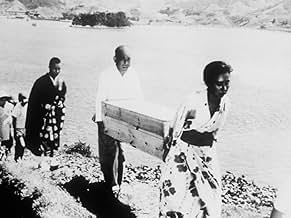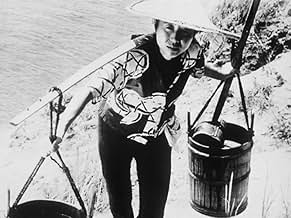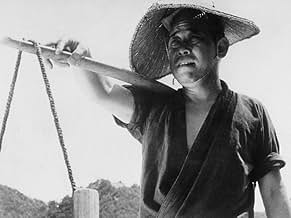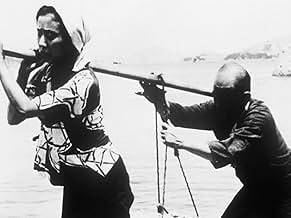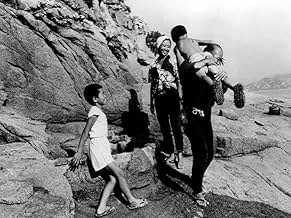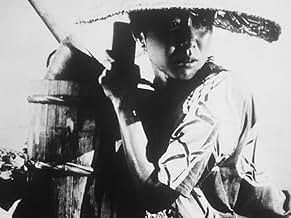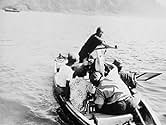NOTE IMDb
8,0/10
6,5 k
MA NOTE
Ajouter une intrigue dans votre langueA family of four are the sole inhabitants of a small island where they struggle each day to irrigate their crops.A family of four are the sole inhabitants of a small island where they struggle each day to irrigate their crops.A family of four are the sole inhabitants of a small island where they struggle each day to irrigate their crops.
- Réalisation
- Scénario
- Casting principal
- Nomination aux 1 BAFTA Award
- 5 victoires et 1 nomination au total
Avis à la une
10billr-3
I remember this film from my student days. I saw it in an uptown, shabby, art house theatre (when art meant porn) in Philadelphia. I was amazed. As I recall, it is a film without dialog. Not silent, but no dialog. Black and white, but singularly visual. Three, maybe four characters with self- effacing directing and camera work, it was as intimate as small off-Broadway theatre. I've seen nothing since as cinematic, or moving. No one I've ever met, has seen it. But I remember it vividly.
10sansay
I saw this movie twenty years ago and I still remember it fondly. It should be part of the training of movie directors to see and analyze this movie. The naked island (as it was named in France) shows the hard struggle of a fisherman's family to survive in a very harsh environment. It is very emotional yet does not call on any modern artifice to carry the message. The music will stay with you forever. My only regret is that I can't get a copy to show my children what movie making can be.
On a tiny island in the Seto Inland Sea, a small family consisting of husband, wife, and two sons, struggle to get by. They are the island's sole inhabitants, and spend their days fetching water from the mainland and carrying up the steep hill in order to water their crops. One day when the mother and father are away from the island, one of the sons falls ill, and the father races to get help. Their lives are all portrayed in painstaking detail, and the film contains no dialogue whatsoever. The film is directed by Kaneto Shindo, who directed the two brilliant Japanese New Wave horror films, Kuraneko and Onibaba, the only two other films of his I've seen.
This is a break in style and subject for Shindo. The two aforementioned horror films were similarly slow and detailed, but The Naked Island contains no action or atmosphere, but certainly shares their beauty. This is a film that shows how far humanity can be pushed in order to merely get by. The climax of the film (and I don't feel I'm ruining anything by revealing it, the story is not important) has their ill son dying, as his father and the doctor arrive too late. After the funeral, they are forced back to work. The mother, needing to grieve, throws down the water and screams into the ground, as the father watches helpless. Afterwards, she gets up, and methodically resumes watering.
Shindo tackles a universal subject with the neglect of the working class. Filmed with no dialogue, it emphasises their facial expressions and body movements in a way the silent era did, and forces the audience to live through the work they do, every step at a time. The director said he wanted to "capture the life of human beings struggling like ants against the forces of nature," and he certainly does that. The film is slow, and focuses a lot of time on the struggle of carrying the water up the hillside. Yet it's filmed with such elegance, it only hammers their struggle home. This is a beautiful and moving film, that is almost brutal in its relentlessness.
www.the-wrath-of-blog.blogspot.com
This is a break in style and subject for Shindo. The two aforementioned horror films were similarly slow and detailed, but The Naked Island contains no action or atmosphere, but certainly shares their beauty. This is a film that shows how far humanity can be pushed in order to merely get by. The climax of the film (and I don't feel I'm ruining anything by revealing it, the story is not important) has their ill son dying, as his father and the doctor arrive too late. After the funeral, they are forced back to work. The mother, needing to grieve, throws down the water and screams into the ground, as the father watches helpless. Afterwards, she gets up, and methodically resumes watering.
Shindo tackles a universal subject with the neglect of the working class. Filmed with no dialogue, it emphasises their facial expressions and body movements in a way the silent era did, and forces the audience to live through the work they do, every step at a time. The director said he wanted to "capture the life of human beings struggling like ants against the forces of nature," and he certainly does that. The film is slow, and focuses a lot of time on the struggle of carrying the water up the hillside. Yet it's filmed with such elegance, it only hammers their struggle home. This is a beautiful and moving film, that is almost brutal in its relentlessness.
www.the-wrath-of-blog.blogspot.com
10pzzz
I saw this 30 years ago -- I walked out then in awe, and it's been on the top of my list ever since.
I came to the internet searching for information on this movie. Not only did I find it, but I found a comment that mirrored my own experience with the movie. I too saw it in my student days, nearly 30 years ago, in a Friday-night "cinema" series in the student union theater. I see it's listed as B&W; I remember it in color -- maybe colorized it in my head? No dialog, just music and environmental sound; gorgeous photography of the island, the sea, the brutally hard work ferrying water for the crops on the terraces. And we follow that work for a long long time; we go through impressed, to irritated (why don't they move to town for chrissake), to rage at being made to sit through this for so long, to numb resignation. So we're right where the characters are. Writhing in my seat, hoping it will come to an end. And then the brief scene that left me stunned, that made sense of all that lead up to it, two seconds of film that explain us in the universe. Like William, I've never met anyone else who's seen this movie. And I don't know if I could sit through it again. But I'm sure glad I did back then.
In a time where cinema was in the whole world was still concerned by representation of lives and social studies, this movie is an intense an important piece. It's great! Strong, hard, oppressing, nice, and emotive. Everything in the hard (but sometimes amazing) life of those workers is showed in it... It's really something the cinema can do at his best. A social study showing every aspect of a style of life, with its private feelings and possible events (thoose who are saying nothing happens mustn't have watched the whole movie. I was surprised by the changing of rhythm in the last 30 minutes).
It's showing everything essential cinema can show: Life, conditions of life, feelings of those who are living, and it's showing it in a very good way. This is a touching and oppressive movie which could maybe even be used as an historical document (for history of the Japanese island farmers in the middle of the XX century) , but also as an intense fiction.
It's showing everything essential cinema can show: Life, conditions of life, feelings of those who are living, and it's showing it in a very good way. This is a touching and oppressive movie which could maybe even be used as an historical document (for history of the Japanese island farmers in the middle of the XX century) , but also as an intense fiction.
Le saviez-vous
- Anecdotes'Hadaka no shima' was made, in the words of its director, "as a 'cinematic poem' to try and capture the life of human beings struggling like ants against the forces of nature."
- ConnexionsReferenced in Century of Cinema: Un siècle de cinéma japonais, par Nagisa Oshima (1995)
Meilleurs choix
Connectez-vous pour évaluer et suivre la liste de favoris afin de recevoir des recommandations personnalisées
- How long is The Naked Island?Alimenté par Alexa
Détails
Box-office
- Montant brut mondial
- 14 673 $US
- Durée1 heure 36 minutes
- Couleur
- Mixage
- Rapport de forme
- 2.35 : 1
Contribuer à cette page
Suggérer une modification ou ajouter du contenu manquant




